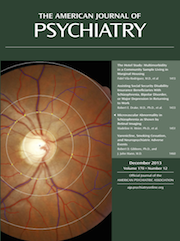Neural Correlates of Emotional Distractibility in Bipolar Disorder Patients, Unaffected Relatives, and Individuals With Hypomanic Personality
Abstract
Objective
Neuropsychological deficits and emotion dysregulation are present in symptomatic and euthymic patients with bipolar disorder. However, there is little evidence on how cognitive functioning is influenced by emotion, what the neural correlates of emotional distraction effects are, and whether such deficits are a consequence or a precursor of the disorder. The authors used functional MRI (fMRI) to investigate these questions.
Method
fMRI was used first to localize the neural network specific to a certain cognitive task (mental arithmetic) and then to test the effect of emotional distractors on this network. Euthymic patients with bipolar I disorder (N=22), two populations at high risk for developing the disorder (unaffected first-degree relatives of individuals with bipolar disorder [N=17]), and healthy participants with hypomanic personality traits [N=22]) were tested, along with three age-, gender-, and education-matched healthy comparison groups (N=22, N=17, N=24, respectively).
Results
There were no differences in performance or activation in the task network for mental arithmetic. However, while all participants exhibited slower responses when emotional distractors were present, this response slowing was greatly enlarged in bipolar patients. Similarly, task-related activation was generally increased under emotional distraction; however, bipolar patients exhibited a further increase in right parietal activation that correlated positively with the response slowing effect.
Conclusions
The results suggest that emotional dysregulation leads to exacerbated neuropsychological deficits in bipolar patients, as evidenced by behavioral slowing and task-related hyperactivation. The lack of such a deficit in high-risk populations suggests that it occurs only after disease onset, rather than representing a vulnerability marker.



